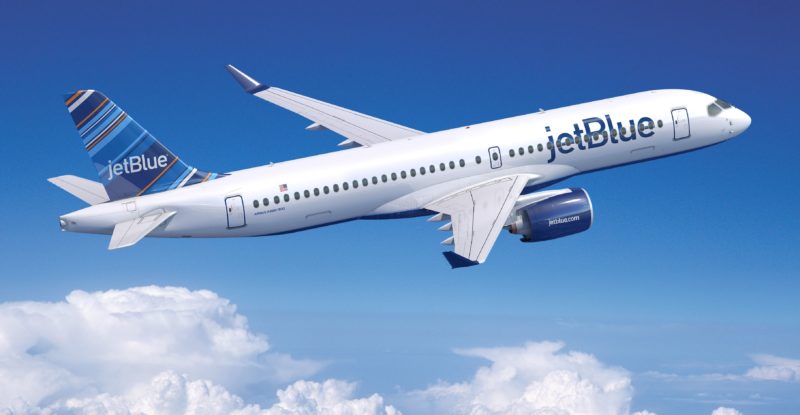 Viasat Inc., a global communications company, announced today JetBlue selected the Viasat in-flight connectivity (IFC) system for the airline’s new fleet of 70 Airbus A220-300 aircraft – for delivery beginning in 2020, with the option for 50 additional aircraft.
Viasat Inc., a global communications company, announced today JetBlue selected the Viasat in-flight connectivity (IFC) system for the airline’s new fleet of 70 Airbus A220-300 aircraft – for delivery beginning in 2020, with the option for 50 additional aircraft.
JetBlue and Viasat have maintained a long-lasting partnership, first launching the Viasat-powered Fly-Fi in-flight Wi-Fi service in December 2013. Since the initial introduction, the two companies have received numerous accolades for bringing free, high-speed, high-quality in-flight Wi-Fi to every seat onboard, with JetBlue being further recognized as the only airline to offer free, fast and full in-flight Wi-Fi capabilities—from streaming, web browsing and more—across the airline’s entire fleet.
“Since launching Fly-Fi, JetBlue has set the pace for how airlines should offer in-flight entertainment and internet services to customers,” said Mariya Stoyanova, director, product development, JetBlue. “We’re creating powerful, engaging onboard experiences with our Viasat-powered Fly-Fi service. Our new agreement with Viasat is a strong endorsement to their ongoing commitment to technology advancement, which we believe will help us continue to deliver great experiences to our customers—no matter where they fly with us.”
JetBlue’s new Airbus A220-300 aircraft will be outfitted with Viasat’s latest Ka-band IFC kit, and is compatible with Viasat’s complete fleet of satellites, including Viasat’s first-generation spacecraft – ViaSat-1, WildBlue-1 and Anik F2, its jointly-owned European satellite, KA-SAT; its second-generation spacecraft ViaSat-2, and the forthcoming ViaSat-3 class of satellites, which is expected to offer near global coverage and nearly eight times more capacity than Viasat’s current fleet—which means even more enhanced connectivity and streaming services across JetBlue’s flight routes.
“We’re incredibly proud to equip JetBlue’s entire new Airbus fleet with our ViaSat-3 capable IFC solution—which we expect will deliver even higher quality entertainment and connectivity services,” said Don Buchman, vice president and general manager, Commercial Aviation at Viasat. “What’s exciting about our partnership, is that throughout the years we have maintained a shared goal: to keep the end-customer front and center by delivering a state-of-the-art connectivity system that would offer a home-like internet experience in the air. With our current and future satellite fleet, we are ready to serve JetBlue as they broaden their plans within the Americas and across to Europe.”
JetBlue was recently named the number one U.S. domestic airline in Travel + Leisure’s World’s Best Awards 2019. As part of this acknowledgment, JetBlue was recognized for its continued investment and coverage expansion of the free Fly-Fi connectivity service.
About Viasat
Viasat is a global communications company that believes everyone and everything in the world can be connected. For more than 30 years, Viasat has helped shape how consumers, businesses, governments and militaries around the world communicate. Today, the Company is developing the ultimate global communications network to power high-quality, secure, affordable, fast connections to impact people’s lives anywhere they are—on the ground, in the air or at sea.
Forward-Looking Statements
This press release contains forward-looking statements that are subject to the safe harbors created under the Securities Act of 1933 and the Securities Exchange Act of 1934. Forward-looking statements include among others, statements that refer to the speed, performance, value, availability, coverage, capacity and reliability of Viasat’s in-flight internet and satellite systems; the ability to meet future broadband demands, including through the ViaSat-3 satellite platform; and the installation of the Viasat in-flight internet system on JetBlue’s aircraft. Factors that could cause actual results to differ include: contractual problems; product defects; manufacturing issues or delays; regulatory issues; technologies not being developed according to anticipated schedules, or that do not perform according to expectations; Viasat’s ability to realize the anticipated benefits of the ViaSat-2 and ViaSat-3 satellite platforms; unexpected expenses or delays related to the satellite systems; the ability to successfully implement Viasat’s business plan for broadband satellite services on Viasat’s anticipated timeline or at all, including with respect to the ViaSat-2 and ViaSat-3 satellite platforms; risks associated with the construction, launch and operation of Viasat’s satellites, including the effect of any anomaly, operational failure or degradation in satellite performance; and increased competition and other factors affecting the aviation sector generally. In addition, please refer to the risk factors contained in Viasat’s SEC filings available at www.sec.gov, including Viasat’s most recent Annual Report on Form 10-K and Quarterly Reports on Form 10-Q. Readers are cautioned not to place undue reliance on any forward-looking statements, which speak only as of the date on which they are made. Viasat undertakes no obligation to update or revise any forward-looking statements for any reason.
Copyright © 2019 Viasat, Inc. All rights reserved. Viasat, the Viasat logo and the Viasat signal are registered trademarks of Viasat, Inc. All other product or company names mentioned are used for identification purposes only and may be trademarks of their respective owners.










